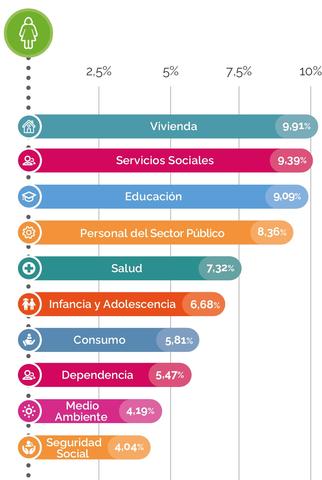L’emploi : 1er domaine de discrimination des femmes
Date of article: 08/03/2023
Daily News of: 09/03/2023
Country:  France
France
Author:
Article language: fr
En 2021, plus de 10% de l’ensemble des dossiers de discriminations reçues par l’institution concernaient le critère du genre. Les femmes sont aussi discriminées sur la base d’autres critères tels que leur origine, situation de famille, orientation sexuelle… À chaque étape de leur vie, elles peuvent subir des discriminations et atteintes à leurs droits : cyber-harcèlement dès le plus jeune âge, discriminations dans l’accès à un logement si elles sont mères célibataires, licenciement en raison de leur grossesse, difficultés pour toucher leur pension de réversion à la retraite.
Dans les réclamations reçues par l’institution, l’emploi est le premier domaine de discrimination pour les femmes. Au-delà des situations individuelles, l’ampleur et la fréquence de ces situations indiquent que ces discriminations subies dans l’emploi sont systémiques.
Discriminations, précarité sociale et conditions de travail
Les personnes travaillant dans les métiers à prédominance féminine semblent particulièrement exposées à ces atteintes aux droits. Ces métiers, présents par exemple dans les secteurs de la santé, l’éducation, ou les services à la personne, sont sous-valorisés dans la société. Les revenus y sont faibles, la pénibilité physique est importante et les conditions de travail sont souvent dégradées. Or, il existe une étroite relation entre conditions de travail, précarité sociale et discriminations : les conditions de travail difficiles et la sous-valorisation de ces métiers constituent un terrain propice aux discriminations, au harcèlement sexuel ou aux agressions sexuelles.
En décembre 2022, la Défenseur des droits a publié avec l’Organisation Internationale du Travail le 15e baromètre sur la perception des discriminations dans l’emploi, consacré aux personnes employées dans le secteur des services à la personne. En France, ce secteur a connu une forte croissance depuis les années 1990. Le baromètre constate notamment que : 87% des emplois sont occupés par des femmes, les personnes nées à l’étranger y sont surreprésentées (14,5% contre 5,5% dans la population active), et qu’une part importante de ces employées sont à la tête d’une famille monoparentale. Ces employées cumulent ainsi différents facteurs discriminants liés au genre, à la situation de famille, au milieu social et à l’origine. La frange la plus précaire des salariées des services à la personne est celle qui apparait la plus exposée aux discriminations dans l’emploi : un tiers de celles ayant des revenus inférieurs à 1 300 euros par mois déclare avoir vécu une discrimination ou un harcèlement discriminatoire au travail, contre 23 % pour l’ensemble de la population active du secteur.
Autre exemple de métier à prédominance féminine précaire : la profession d’accompagnants d'élèves en situation de handicap (AESH). Dans son rapport de septembre 2022 « L’accompagnement humain des élèves en situation de handicap », le Défenseur des droits y décrit le statut peu attractif des AESH : temps-partiels, rémunérations équivalentes à environ 800€ par mois, forte mobilité, manque de formation, etc.
Une revalorisation nécessaire
Dans ce contexte, atteindre l’égalité femmes-hommes dans le monde du travail et garantir l’effectivité des droits des femmes doit passer par une revalorisation des salaires et une meilleure reconnaissance de ces emplois.
La Défenseure des droits appelle ainsi à une plus forte mobilisation des pouvoirs publics et des employeurs qui doivent protéger les salariées et garantir de manière effective le principe d’égalité. En effet, le droit de la non-discrimination, consacrant le principe de « salaire égal pour un travail de valeur comparable », exige la mise en œuvre d’une politique volontariste de revalorisation des métiers à prédominance féminine comme dans les secteurs des services à la personne ou de la santé, qu’il s’agisse des revenus, des conditions de travail, de la protection sociale et juridique, de la formation ou de la reconnaissance statutaire.
Une attention particulière doit également être portée aux mesures de prévention, de protection et de sanction en matière de discrimination, et notamment de harcèlement sexuel, en veillant particulièrement aux catégories de salariées les plus marginalisées de ces secteurs d’activité. Des amendes et pénalités dissuasives sont également nécessaires.
« Aujourd’hui, en France, ce n’est pas le cas : un employeur qui discrimine sera, au pire, condamné à payer ce qu'il aurait dû payer s'il n'avait pas discriminé. Ce n'est pas motivant. Il faut des amendes beaucoup plus fortes. »





